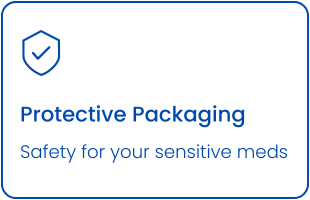Description
Major Triple Antibiotic Ointment - 1 oz (Generic Neosporin)
- Compare to the active ingredients in Neosporin
- Bacitracin Zinc - Neomycin Sulfate - Polymyxin B Sulfate
- Protection against infection
- First aid antibiotic
- Original Strength
Expiration Date: 5-2025
Ingredients
- Active Ingredients: Bacitracin Zinc, Neomycin Sulfate, Polymyxin B Sulfate - First Aid Antibiotic
- Inactive Ingredients: White Petrolatum
Uses
- First aid to help prevent infection in minor cuts, scrapes, and burns
FULL DESCRIPTION
Drug Facts
Active Ingredients (in each gram)
- Bacitracin zinc, USP 400 units
- Neomycin 3.5 mg
- Polymyxin B Sulfate, USP 5000 units
- Purpose: First aid antibiotic
Uses
- First aid to help prevent infection in minor cuts, scrapes, and burns
Warnings
- For External Use Only
- Allergy Alert
- Do not use if allergic to any of the ingredients
- Do not use in the eyes or over large areas of the body
- Ask a Doctor Before Use if You Have
- Deep or puncture wounds
- Animal bites
- Serious burns
- When Using This Product
- Do not use longer than 1 week unless directed by a doctor
- Stop Use and Ask a Doctor If
- Condition persists or gets worse
- A rash or other allergic reaction develops
- Keep Out of Reach of Children
- If swallowed, get medical help or contact a Poison Control Center right away
Directions
- Clean affected area
- Apply a small amount of this product (an amount equal to the surface area of the tip of a finger) on the area 1 to 3 times daily
- May be covered with a sterile bandage
Other Information
- Store at controlled room temperature 59 - 86°F (15 - 50°C)
- Protect from freezing
- Before using any medication, read all label directions
- Keep carton, it contains important information
Inactive Ingredients
- White Petrolatum
F25CN31A
What does Major Triple Antibiotic Ointment treat?
Major Triple Antibiotic Ointment is a topical medication that contains three antibiotics: bacitracin, neomycin, and polymyxin B. It is commonly used to prevent or treat bacterial infections in minor cuts, wounds, or skin abrasions. The combination of these antibiotics helps to provide broad-spectrum coverage against various types of bacteria.
The primary indications for Major Triple Antibiotic Ointment include:
1. Minor cuts and abrasions: The ointment can be applied to clean, superficial wounds to help prevent infection and promote healing.
2. Skin infections: It may be used to treat minor skin infections caused by susceptible bacteria, such as impetigo or small localized boils.
3. Surgical incisions: Major Triple Antibiotic Ointment can sometimes be used as directed by a healthcare professional to prevent infection in small surgical incisions or to aid in the healing process.
It is important to note that Major Triple Antibiotic Ointment is intended for external use only and should not be used in the eyes, ears, nose, or mouth unless specifically directed by a healthcare professional. Additionally, it is not effective against fungal or viral infections.
If you have a specific wound or skin infection and are considering using Major Triple Antibiotic Ointment, it is advisable to consult with a healthcare professional for an accurate diagnosis and appropriate treatment recommendation. They can evaluate your condition and determine the most suitable course of action.
What's the difference between Neosporin and triple antibiotic ointment?
1. Active Ingredients: Neosporin contains three active ingredients: bacitracin, neomycin, and polymyxin B, just like triple antibiotic ointment. However, the specific formulation and concentrations of these ingredients may vary between different brands of triple antibiotic ointment.
2. Additional Ingredient: Neosporin also contains an additional ingredient called pramoxine, which is a local anesthetic. This ingredient provides temporary relief from pain and itching associated with minor cuts and wounds.
3. Brand Name: Neosporin is a specific brand name for the combination of bacitracin, neomycin, polymyxin B, and pramoxine. On the other hand, triple antibiotic ointment is a broader term that refers to any ointment containing a combination of three antibiotics without the addition of pramoxine.
4. Availability: Neosporin is a widely recognized and commonly available brand, while triple antibiotic ointment may be available under different brand names or as generic versions.
It's important to note that some individuals may have allergies or sensitivities to specific antibiotics. Before using any topical antibiotic ointment, it is advisable to read the product packaging and consult with a healthcare professional if you have known allergies or if you experience any adverse reactions.
Overall, both Neosporin and triple antibiotic ointment can be effective in preventing or treating bacterial infections in minor cuts and wounds. The choice between them may depend on factors such as personal preference, availability, and specific needs or allergies of the individual.
Are all triple antibiotic ointment the same?
No, not all triple antibiotic ointments are exactly the same. While they typically contain a combination of three antibiotics (bacitracin, neomycin, and polymyxin B), there can be variations in the specific formulation, concentrations, and additional ingredients among different brands or generic versions.
The active ingredients in triple antibiotic ointments are generally the same, but the inactive ingredients, such as the base or carrier of the ointment, can differ. These variations in the formulation can affect factors such as the texture, absorption, and overall properties of the ointment.
It's important to note that different individuals may have different sensitivities or allergies to specific antibiotics or inactive ingredients. Therefore, if you have known allergies or experience any adverse reactions, it's recommended to consult with a healthcare professional or pharmacist before using a particular brand or generic version of triple antibiotic ointment.
When using a triple antibiotic ointment, it's advisable to follow the instructions provided by the manufacturer or the guidance of a healthcare professional. If you have any concerns or questions about the use of triple antibiotic ointment or its suitability for your specific condition, it's best to consult with a healthcare professional for personalized advice.
What is stronger than triple antibiotic ointment?
1. Prescription-Strength Antibiotic Creams or Ointments: Healthcare professionals may prescribe topical antibiotic creams or ointments that contain stronger antibiotics, such as mupirocin (e.g., Bactroban) or gentamicin. These medications may have a broader spectrum of activity against bacteria and can be more effective in certain cases.
2. Oral Antibiotics: In more severe cases of bacterial infections, oral antibiotics may be prescribed. These antibiotics are taken by mouth and can have a systemic effect, reaching the site of infection through the bloodstream. The choice of oral antibiotic will depend on the specific bacteria causing the infection and the individual's health condition.
3. Intravenous (IV) Antibiotics: For severe or systemic infections, intravenous antibiotics may be necessary. These antibiotics are administered directly into a vein through an IV line, allowing for higher concentrations of the medication to be delivered to the infection site.
It's important to note that the appropriate treatment will depend on the specific bacterial infection, its severity, the individual's health condition, and other factors. It is always recommended to consult with a healthcare professional for an accurate diagnosis and appropriate treatment recommendation.
Self-diagnosis and self-treatment with stronger medications without medical guidance can be risky and may lead to adverse effects or the development of antibiotic resistance. It's best to seek professional medical advice for proper evaluation and treatment.
What are the side effects of triple antibiotic ointment?
Triple antibiotic ointment, which typically contains a combination of bacitracin, neomycin, and polymyxin B, can cause side effects in some individuals. The following are potential side effects associated with the use of triple antibiotic ointment:
1. Allergic Reactions: Some individuals may be allergic to one or more of the antibiotics in the ointment. Allergic reactions can manifest as skin rash, itching, swelling, or hives. If you experience any signs of an allergic reaction, discontinue use and seek medical attention.
2. Skin Irritation: Triple antibiotic ointment can occasionally cause skin irritation, redness, or a burning sensation at the application site. This is typically mild and temporary. If irritation persists or worsens, discontinue use and consult a healthcare professional.
3. Superinfection: Prolonged or excessive use of triple antibiotic ointment can lead to the development of secondary infections caused by resistant bacteria or fungi. It's important to follow the recommended duration of use and consult a healthcare professional if the infection worsens or does not improve.
4. Sensitivity Reactions: In rare cases, individuals may experience a sensitivity reaction to one or more of the antibiotics in the ointment. This can manifest as contact dermatitis or other skin reactions.
5. Systemic Absorption: Although the systemic absorption of topical triple antibiotic ointment is generally minimal, it is possible for a small amount of the medication to enter the bloodstream. This can potentially lead to systemic side effects, especially if large amounts of the ointment are applied to extensive areas of damaged skin. This risk is generally low when using the ointment as directed.
It's important to note that these side effects are not exhaustive, and individuals may experience different reactions or have specific sensitivities. If you have any concerns or experience unexpected side effects while using triple antibiotic ointment, it is recommended to discontinue use and consult a healthcare professional for further evaluation and guidance.
Generic Equivalent To: |
Neosporin |
Expiration Date: |
5-2025 |























